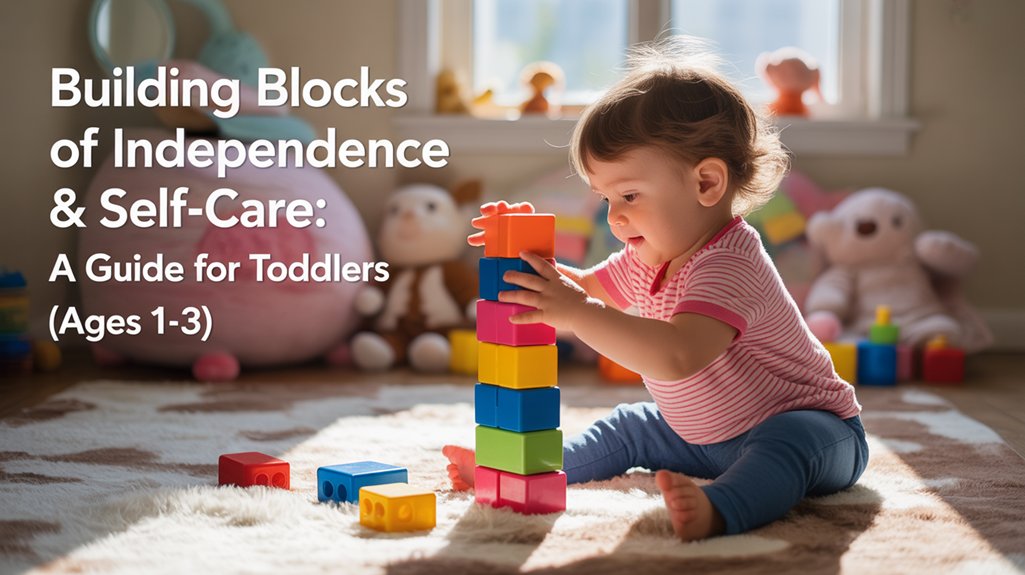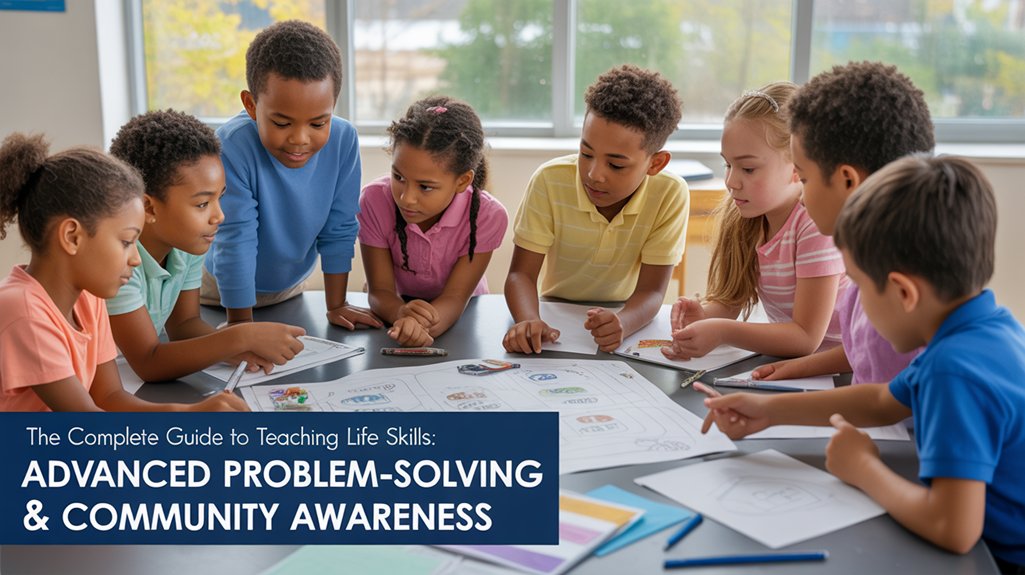You'll teach life skills most effectively when you match them to your child's developmental stage. Start with self-care routines and social skills for toddlers and preschoolers, then introduce money management and chores in early elementary years. As your child grows, focus on problem-solving and community awareness in upper elementary, digital literacy and time management in middle school, and finally career preparation and financial independence during high school. This extensive manual explores specific strategies and age-appropriate activities that'll change everyday moments into powerful learning opportunities.
Key Takeaways
- Toddlers and preschoolers develop independence through self-care routines, social skills via sharing games, and comprehension using visual charts and simple instructions.
- Early elementary children learn money management through allowances, organizational systems with labeled bins, and responsibility via age-appropriate chores.
- Upper elementary students advance problem-solving through conflict resolution, community awareness via service projects, and financial literacy through budgeting exercises.
- Middle schoolers master digital citizenship and online safety, self-advocacy through role-play, and time management using planners for balancing responsibilities.
- High schoolers prepare for adulthood through career exploration internships, financial independence training in banking and credit, and networking with professional mentors.
Toddlers (Ages 1-3): Building Blocks of Independence and Self-Care

The toddler years mark a critical window when children first grasp that they can do things independently. You'll witness remarkable independence milestones as your child discovers their capabilities through simple tasks like feeding themselves with utensils, drinking from cups, and attempting to dress themselves.
Establishing self care routines during this stage creates patterns that last a lifetime. Start with hand-washing before meals, putting dirty clothes in hampers, and helping clean up toys. These activities develop motor skills while building confidence.
Simple daily habits like washing hands, organizing clothes, and tidying toys lay the foundation for lifelong self-care patterns and growing confidence.
You're not aiming for perfection—expect spills, inside-out shirts, and mismatched shoes. Your role is providing opportunities and patient guidance. Break tasks into manageable steps: “First, we put arms through sleeves. Then, we pull the shirt down.”
Research shows toddlers who practice age-appropriate tasks develop stronger executive function skills later. By encouraging independence now, you're equipping children with competence and self-reliance they'll carry forward into increasingly complex responsibilities.
These foundational skills also support overall health by helping children develop the confidence and capabilities needed to thrive in all areas of their development.
Preschoolers (Ages 3-5): Developing Social Skills and Basic Responsibilities
Your preschooler's growing independence creates the perfect opportunity to introduce simple household tasks like putting toys away, setting napkins on the table, and helping sort laundry by color.
At this stage, children are developmentally ready to grasp social concepts like sharing, taking turns, and waiting patiently—skills best learned through consistent practice during playdates and family activities.
You'll find that preschoolers thrive when they follow predictable routines with clear, step-by-step instructions such as “First wash your hands, then sit at the table.
Many parent information resources emphasize that this age group benefits from guidance that helps establish healthy habits and safety practices early in their development.
Age-Appropriate Household Tasks
Between ages three and five, children's growing motor skills and desire for independence make them enthusiastic participants in simple household tasks.
You'll find they can successfully put toys away, help set the table with unbreakable items, and match socks from laundry. These age appropriate chores build confidence while teaching responsibility.
Start with one-step instructions, then gradually add complexity as they master each skill. Wiping spills, watering plants, and feeding pets become manageable skill building activities that contribute meaningfully to family life.
You're not just assigning tasks—you're nurturing capable, contributing family members.
Expect imperfection and offer specific praise for effort rather than results. When you model patience during their learning process, you're teaching perseverance alongside practical skills.
Their genuine pride in helping others begins here.
Sharing and Taking Turns
Most preschoolers struggle with sharing because their developmental stage centers on discovering ownership and autonomy. You'll help them develop this vital skill through structured practice and patience.
Start with turn-taking activities using timers to establish clear boundaries. Sharing games work best when children see concrete benefits, like cooperative block building or collaborative art projects.
| Age | Appropriate Strategy |
|---|---|
| 3 years | Practice with duplicates; offer identical toys |
| 3-4 years | Use 2-minute timers for turn-taking |
| 4 years | Introduce sharing games requiring cooperation |
| 4-5 years | assist negotiation between children |
| 5 years | Encourage independent problem-solving |
Model sharing through your actions and narrate when others share successfully. Acknowledge the difficulty: “Sharing feels hard, but you waited patiently.” This validation helps children develop empathy while mastering essential social skills.
Following Simple Routine Instructions
Preschoolers can successfully follow two- to three-step instructions when you present them clearly and consistently. Begin with familiar tasks like “Put your toys away, then wash your hands.” Use verbal cues that are specific and sequential, helping children understand what comes next.
Routine charts provide visual reinforcement, showing the order of daily activities through pictures and words. Place these charts at your child's eye level in relevant spaces—bathroom routines near the sink, morning routines in the bedroom.
Break complex tasks into manageable steps, allowing time between each instruction. Consistency matters: use the same words and sequence daily.
When children successfully complete instructions, acknowledge their capability. This practice builds executive function skills, nurturing independence and confidence. You're equipping them with foundational skills they'll use throughout their lives.
Early Elementary (Ages 6-8): Money Management, Household Chores, and Personal Organization
As your child enters early elementary school, their cognitive abilities expand to grasp concrete concepts like counting money and understanding cause-and-effect relationships between work and reward.
You'll find this developmental stage ideal for introducing simple financial literacy through allowances tied to completed chores, while also teaching organizational systems like using labeled bins or maintaining a homework folder.
These foundational skills build executive function and responsibility that research shows directly correlates with academic success and long-term financial health.
Age-Appropriate Money Concepts
When children enter early elementary school, their cognitive development reaches an essential stage where abstract thinking begins to merge with concrete experiences, making this the ideal window to introduce foundational money concepts.
You'll find they're ready to understand coin values, making change, and distinguishing needs from wants. Introduce saving strategies through clear jars where they can watch money accumulate toward specific goals. This visual approach reinforces delayed gratification—a crucial life skill.
Start with budgeting basics by dividing allowance into three categories: spending, saving, and sharing. This framework teaches financial responsibility while nurturing generosity.
You can guide them through simple transactions at stores, helping them calculate costs and understand that money is finite. These practical experiences build mathematical skills while establishing healthy financial habits.
Building Organizational Habits Early
Beyond managing money, six-to-eight-year-olds thrive when they develop organizational systems that give them ownership over their belongings and daily routines.
You'll enable children by introducing simple time management tools like visual schedules and morning checklists. These concrete systems help them understand task prioritization—distinguishing between homework that's due tomorrow versus next week.
Start with designated spaces for backpacks, school papers, and toys. Guide children to sort items by category and return them consistently.
This age group responds well to color-coding systems and picture labels that reduce decision fatigue.
Establish predictable routines for morning preparations and bedtime. When children practice packing their school bags the night before or laying out tomorrow's clothes, they're building executive function skills that'll serve them throughout life.
These foundational habits create confident, capable young people.
Upper Elementary (Ages 9-11): Advanced Problem-Solving and Community Awareness

Children entering upper elementary school experience a cognitive leap that enables them to tackle multi-step challenges and understand their role within larger social systems.
You'll notice they're ready to handle complex decision-making that considers multiple perspectives and long-term consequences.
Introduce conflict resolution through real scenarios where they practice active listening, identify underlying issues, and develop mutually beneficial solutions.
These skills build empathy while teaching them to navigate disagreements constructively. They can now understand how their actions affect others beyond their immediate circle.
Community service becomes meaningful at this stage as children grasp abstract concepts like social responsibility.
Engage them in projects where they see direct impact—food drives, environmental initiatives, or visiting senior centers. They'll connect personal effort with community benefit.
Foster financial literacy through budgeting projects and charitable giving decisions.
Encourage them to research causes, compare options, and explain their reasoning. This develops critical thinking while reinforcing values of generosity and civic engagement.
Middle School (Ages 12-14): Digital Literacy, Self-Advocacy, and Time Management
Middle school marks the beginning of adolescence, where your child's world expands dramatically through technology, increased independence, and complex social interactions. During these formative years, you'll guide them toward responsible digital citizenship and online safety while nurturing essential self-management skills.
Focus on these developmental priorities:
| Skill Area | Specific Competencies | Teaching Approach |
|---|---|---|
| Digital Literacy | Social media awareness, password security, recognizing misinformation | Model healthy technology habits and discuss real scenarios |
| Online Safety | Privacy settings, identifying scams, appropriate sharing boundaries | Establish clear guidelines with reasonable monitoring |
| Self-Advocacy | Communicating needs to teachers, seeking help, speaking up respectfully | Role-play difficult conversations and validate their concerns |
| Time Management | Balancing homework, activities, and downtime | Use planners and teach prioritization strategies |
| Financial Basics | Budgeting allowance, understanding needs versus wants | Provide opportunities for earning and managing money |
These competencies prepare adolescents for high school's increased demands while encouraging responsible independence.
High School (Ages 15-18): Career Preparation, Financial Independence, and Life Transitions

As your teenager approaches adulthood, the high school years become a critical bridge between dependence and self-sufficiency, demanding intentional preparation for career decisions, financial management, and independent living.
Focus on career exploration through internships, job shadowing, and vocational assessments that match strengths with opportunities. Teach resume writing and job interviewing techniques through mock sessions and real applications. Build networking skills by connecting teens with mentors in fields of interest.
Financial literacy becomes paramount—guide them through budgeting, banking, credit management, and understanding taxes. Have them practice paying bills and managing a checking account independently.
Strengthen goal setting abilities by helping them create actionable plans for post-graduation pathways, whether college, trade school, or workforce entry. Reinforce time management through balancing academics, employment, and personal responsibilities.
These evolving adulthood skills enable teenagers to serve their communities effectively while building sustainable, independent futures that reflect their values and aspirations.
Practical Teaching Strategies That Work Across All Ages
While developmental stages vary considerably from toddlerhood through high school, certain foundational teaching approaches transcend age boundaries and create lasting behavioral change.
You'll find success by modeling behaviors before expecting mastery. Children learn through observation, making your actions more influential than words. Incorporate creative learning opportunities that match their developmental capacity—toddlers need sensory exploration while teens benefit from problem-solving scenarios.
Break complex skills into manageable steps, celebrating progress at each milestone. Cooperative play strengthens social competencies across all ages, whether it's sharing toys or collaborative projects.
| Strategy | Implementation Across Ages |
|---|---|
| Consistent repetition | Toddlers need daily practice; teens require periodic reinforcement |
| Natural consequences | Allow age-appropriate failures as learning opportunities |
| Positive reinforcement | Immediate praise for young children; delayed recognition for teens |
| Hands-on practice | Physical manipulation for toddlers; real-world application for teens |
| Gradual independence | Scaffold support, removing assistance as competence grows |
You're cultivating lifelong capabilities by adapting these principles to each child's readiness level.
Frequently Asked Questions
What if My Child Has Special Needs or Developmental Delays?
You'll need tailored approaches that honor your child's unique timeline and abilities.
Break skills into smaller steps, celebrate progress at their pace, and use adaptive strategies like visual schedules, hands-on tools, or extended practice time.
Partner with therapists and educators who understand developmental milestones in special needs contexts.
Remember, your child can learn life skills—they may just need different pathways.
Your patience and individualized support will help them build confidence and independence that truly serves their growth.
How Do I Teach Life Skills to Children in Blended Families?
Nearly 40% of families with children are blended, making your teaching approach essential.
You'll need tailored communication strategies that respect each child's unique background and developmental milestones. Start by establishing consistent routines across households while honoring blended family interactions.
Create opportunities for step-siblings to learn together through shared chores and problem-solving activities. You're building bridges when you acknowledge different parenting styles and involve all caregivers in teaching age-appropriate skills, nurturing unity while celebrating each child's individual growth journey.
Should Grandparents Follow the Same Life Skills Teaching Approach as Parents?
Yes, grandparent involvement works best when there's teaching consistency with parents' approaches.
You'll want to align on age-appropriate expectations and developmental milestones while respecting grandparents' unique relationship with your children. They don't need identical methods, but shared core values and basic skill expectations prevent confusion.
Consider creating a simple guide together that honors their wisdom while maintaining consistency. This collaboration strengthens your child's learning and deepens intergenerational bonds that benefit everyone's growth.
How Do Cultural Differences Affect Which Life Skills to Prioritize?
Cultural values fundamentally shape your skill prioritization when teaching children.
You'll emphasize different developmental milestones based on your community's needs—collectivist cultures often prioritize cooperation and family contribution earlier, while individualist societies may focus on independence and self-advocacy.
You're serving your child best when you balance evidence-based universal skills (like emotional regulation and problem-solving) with culturally-relevant abilities that'll help them thrive within their specific community and maintain meaningful connections with their heritage.
What if My Teenager Refuses to Learn Basic Life Skills?
Persistent pushback from teens typically reflects deeper developmental needs rather than defiance.
You'll find success through motivation strategies that emphasize autonomy—let them choose which skills to tackle first.
Apply communication techniques that connect life skills to their goals: driving requires budgeting for gas, independence needs cooking abilities.
Frame learning as respectful coaching, not parenting.
When you honor their emerging adulthood while providing structure, resistance often evolves into engagement.
Conclusion
You've witnessed the journey from a toddler's first attempts at pulling on socks to a teen's final college application. What seemed impossibly complex—tying shoes, managing money, steering through relationships—becomes second nature through patient teaching. Yet here's the paradox: while you're preparing your child for independence, you're also deepening your connection. Each life skill you teach isn't pushing them away; it's giving them the confidence to stay close while standing strong on their own.






